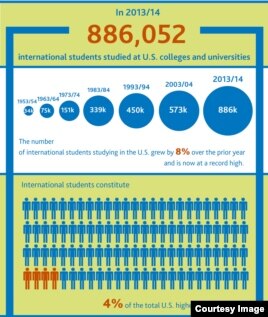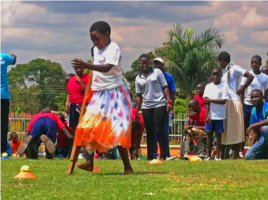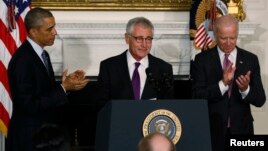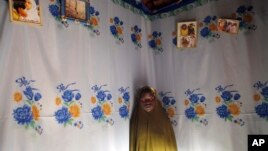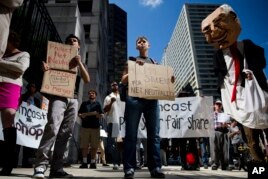25 November, 2014
The Central African Republic has been unsettled since 2013. First, the Seleka rebel group ousted the government. The Seleka fighters were mostly Muslim. Christian militias answered with rebel attacks. Thousands of people have been killed in the fighting. Millions have been forced from their homes.
Among the victims are children whose parents died or have gone missing. For these boys and girls, joining an armed group is one of the only ways to find protection.
A boy named Jerome said he joined a militia when an opposing group attacked his village. Some people were burned in their homes. Others were shot when they sought to run away.
"I'll never forget that day," he says. "The Seleka killed my uncle. That pushed me to join the anti-balaka militia."
The anti-balaka is a coalition of armed groups opposed to the Seleka rebels. Another boy, Serge, joined the anti-balaka just before it attacked the capital in December 2013.

FILE - Fighters from a Christian militia movement known as the "anti-balaka" display their makeshift weaponry in the village of Boubou, halfway between the towns of Bossangoa and Bouca, in the Central African Republic. (AP Photo/Florence Richard)
He says, "I was a good fighter. Fearless. The commander liked me."
Serge says he is 17 years old. But he has a boy's face and a thin body. He looks much younger.
Most children in the armed groups are teenagers. Some are younger than 10.
Serge says children's ages and sizes help to determine their positions in the armed groups. Strong boys such as Serge might become fighters. Younger children clean up.
Judith Léveillée is a deputy representative of UNICEF, the United Nations' Children's Fund. She said the number of children who are part of armed groups has risen over the past few months. She says that up to 10,000 children have ties to the armed groups. Some have been part of the militias for two years.
"In some cases, they've gone so far in the level of atrocities that it's very difficult for them to return to where they are from. If we don't accelerate and respond to the needs, there is a risk there will be a lost generation in this country."
UNICEF has negotiated with the groups to release about 1,400 of the children, including Jerome and Serge. One fifth of the children being released are girls. Ms. Léveillée says they were used as cooks, cleaners or were given to commanders to marry.
"They do all the camp chores, but also act as sex slaves or they get under the protection of one of the commanders. Sometimes they get pregnant. Some are really young, 10, 12, 14 years old. When they are released from the armed groups we really have to pay attention to their needs and to make sure to provide them with support so that they can earn a living or go back to school and care for their child."
Ms. Léveillée says the children need a chance to re-join their families. But for some, like Jerome, returning to his mother and father is not possible.
Serge is not in contact with his family either, and he does not know what is happening in his hometown. He said when he was with the anti-balaka group, he wore a rebel uniform that made people respect him. He felt like a man.
If the battle continues, he said, and the group needs him, he will join the anti-balaka again.
I'm Kelly Jean Kelly.
*This report was based on a story from reporter Katarina Hoiji in Bangui. Kelly Jean Kelly wrote the story for VOA Learning English. George Grow was the editor.
______
Words in this Story
rebel – adj. acting against a government or power, often with force
militias – n. armies of citizens instead of professional soldiers; private armies
village – n. a very small town
Now it's your turn to use these Words in this Story. In the comments section, write a sentence using one of these words and we will provide feedback on your use of vocabulary and grammar.


